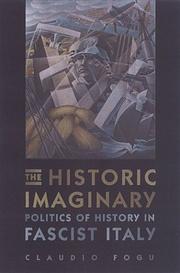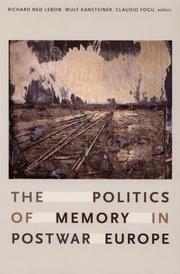| Listing 1 - 8 of 8 |
Sort by
|

ISBN: 0802087647 1281994375 1442681446 9786611994372 Year: 2003 Publisher: Toronto, [Ontario] ; Buffalo, [New York] ; London, [England] : University of Toronto Press,
Abstract | Keywords | Export | Availability | Bookmark
 Loading...
Loading...Choose an application
- Reference Manager
- EndNote
- RefWorks (Direct export to RefWorks)
Focusing on both ritual and mass-visual representations of history in 1920s and 1930s Italy, The Historic Imaginary unveils how Italian Fascism sought to institutionalize a modernist culture of history. The study takes a new historicist and microhistorical approach to cultural-intellectual history, integrating theoretical tools of analysis acquired from visual-cultural studies, art history, linguistics, and reception theory in a sophisticated examination of visual modes of historical representation - from commemorations to monuments to exhibitions and mass-media spanning the entire period of the Italian-fascist regime. Claudio Fogu argues that the fascist historic imaginary was intellectually rooted in the actualist philosophy of history elaborated by Giovanni Gentile, culturally grounded in Latin-Catholic rhetorical codes, and aimed at overcoming both Marxist and liberal conceptions of the relationship between historical agency, representation, and consciousness. The book further proposes that this modernist vision of history was a core element of fascist ideology, encapsulated by the famous Mussolinian motto that "fascism makes history rather than writing it," and that its institutionalization constituted a key point of intersection between the fascist aesthetization and sacralization of politics. The author finally claims that his study of fascist historic culture opens the way to an understanding and re-evaluation of the historical relationship between the modernist critique of historical consciousness and the rise of post-modernist forms of temporality.
Fascism and culture --- Fascism --- History --- Historiography --- History in art --- Fascisme et culture --- Fascisme --- Histoire dans l'art --- Historiographie --- Histoire --- Italy --- Italie --- Civilization --- Civilisation --- Historiography.
Book
ISBN: 3030598578 303059856X Year: 2020 Publisher: Cham, Switzerland : Palgrave Macmillan,
Abstract | Keywords | Export | Availability | Bookmark
 Loading...
Loading...Choose an application
- Reference Manager
- EndNote
- RefWorks (Direct export to RefWorks)
This book explores the role of Mediterranean imaginaries in one of the preeminent tropes of Italian history: the formation or 'making of' Italians. While previous scholarship on the construction of Italian identity has often focused too narrowly on the territorial notion of the nation-state, and over-identified Italy with its capital, Rome, this book highlights the importance of the Mediterranean Sea to the development of Italian collective imaginaries. From this perspective, this book re-interprets key historical processes and actors in the history of modern Italy, and thereby challenges mainstream interpretations of Italian collective identity as weak or incomplete. Ultimately, it argues that Mediterranean imaginaries acted as counterweights to the solidification of a 'national' Italian identity, and still constitute alternative but equally viable modes of collective belonging.
Italy—History. --- Historiography. --- Civilization—History. --- World history. --- History of Italy. --- Historiography and Method. --- Cultural History. --- World History, Global and Transnational History. --- Historical criticism --- History --- Authorship --- Universal history --- Criticism --- Historiography --- Italy --- Civilization --- History. --- Cultural history --- Collective memory --- Italians --- Origin. --- Ethnology --- Collective remembrance --- Common memory --- Cultural memory --- Emblematic memory --- Historical memory --- National memory --- Public memory --- Social memory --- Memory --- Social psychology --- Group identity --- National characteristics --- Methodology.

ISBN: 1281994375 9786611994372 1442681446 9781442681446 9781281994370 0802087647 9780802087645 Year: 2003 Publisher: Toronto
Abstract | Keywords | Export | Availability | Bookmark
 Loading...
Loading...Choose an application
- Reference Manager
- EndNote
- RefWorks (Direct export to RefWorks)
Focusing on both ritual and mass-visual representations of history in 1920s and 1930s Italy, The Historic Imaginary unveils how Italian Fascism sought to institutionalize a modernist culture of history. The study takes a new historicist and microhistorical approach to cultural-intellectual history, integrating theoretical tools of analysis acquired from visual-cultural studies, art history, linguistics, and reception theory in a sophisticated examination of visual modes of historical representation - from commemorations to monuments to exhibitions and mass-media spanning the entire period of the Italian-fascist regime. Claudio Fogu argues that the fascist historic imaginary was intellectually rooted in the actualist philosophy of history elaborated by Giovanni Gentile, culturally grounded in Latin-Catholic rhetorical codes, and aimed at overcoming both Marxist and liberal conceptions of the relationship between historical agency, representation, and consciousness. The book further proposes that this modernist vision of history was a core element of fascist ideology, encapsulated by the famous Mussolinian motto that "fascism makes history rather than writing it," and that its institutionalization constituted a key point of intersection between the fascist aesthetization and sacralization of politics. The author finally claims that his study of fascist historic culture opens the way to an understanding and re-evaluation of the historical relationship between the modernist critique of historical consciousness and the rise of post-modernist forms of temporality.
Fascism and culture --- Fascism --- Culture and fascism --- Culture --- History --- Historiography. --- Italy --- Italia --- Italian Republic (1946- ) --- Italianska republika --- Italʹi︠a︡nskai︠a︡ Rėspublika --- Italie --- Italien --- Italii︠a︡ --- Italii︠a︡ Respublikasi --- Italiĭsʹka Respublika --- Itālija --- Itālijas Republika --- Italijos Respublika --- Italikē Dēmokratia --- Īṭāliyā --- Italiya Respublikasi --- It'allia --- It'allia Konghwaguk --- İtalya --- İtalya Cumhuriyeti --- Iṭalyah --- Iṭalye --- Itaria --- Itaria Kyōwakoku --- Jumhūrīyah al-Īṭālīyah --- Kgl. Italienische Regierung --- Königliche Italienische Regierung --- Laško --- Lýðveldið Ítalía --- Olasz Köztársaság --- Olaszország --- Regno d'Italia (1861-1946) --- Repubblica italiana (1946- ) --- Republiḳah ha-Iṭalḳit --- Włochy --- Yidali --- Yidali Gongheguo --- Ιταλική Δημοκρατία --- Ιταλία --- Итальянская Республика --- Италианска република --- Италия --- Италия Республикаси --- Італьянская Рэспубліка --- Італія --- Італійська Республіка --- איטאליע --- איטליה --- רפובליקה האיטלקית --- إيطاليا --- جمهورية الإيطالية --- イタリア --- イタリア共和国 --- 意大利 --- 意大利共和国 --- 이탈리아 --- 이탈리아 공화국 --- Sardinia (Italy)
Multi
ISBN: 9783030598570 3030598578 Year: 2020 Publisher: Cham : Springer International Publishing : Imprint: Palgrave Macmillan,
Abstract | Keywords | Export | Availability | Bookmark
 Loading...
Loading...Choose an application
- Reference Manager
- EndNote
- RefWorks (Direct export to RefWorks)
This book explores the role of Mediterranean imaginaries in one of the preeminent tropes of Italian history: the formation or 'making of' Italians. While previous scholarship on the construction of Italian identity has often focused too narrowly on the territorial notion of the nation-state, and over-identified Italy with its capital, Rome, this book highlights the importance of the Mediterranean Sea to the development of Italian collective imaginaries. From this perspective, this book re-interprets key historical processes and actors in the history of modern Italy, and thereby challenges mainstream interpretations of Italian collective identity as weak or incomplete. Ultimately, it argues that Mediterranean imaginaries acted as counterweights to the solidification of a 'national' Italian identity, and still constitute alternative but equally viable modes of collective belonging.
History as a science --- World history --- History of civilization --- History of Italy --- historiografie --- wereldgeschiedenis --- cultuurgeschiedenis --- geschiedenis --- Italy --- Historiography. --- History --- Civilization --- World history. --- History of Italy. --- Historiography and Method. --- Cultural History. --- World History, Global and Transnational History. --- History. --- Methodology.

ISBN: 9781442681446 9780802087645 1442681446 1281994375 9781281994370 0802087647 Year: 2003 Publisher: Toronto, Ont. University of Toronto Press
Abstract | Keywords | Export | Availability | Bookmark
 Loading...
Loading...Choose an application
- Reference Manager
- EndNote
- RefWorks (Direct export to RefWorks)

ISBN: 0822338173 9780822338178 9780822338024 0822338025 0822388332 Year: 2006 Publisher: Durnham Duke University Press
Abstract | Keywords | Export | Availability | Bookmark
 Loading...
Loading...Choose an application
- Reference Manager
- EndNote
- RefWorks (Direct export to RefWorks)
Comparative case studies of how memories of World War II have been constructed and revised in France, Germany, Austria, Switzerland, Poland, Italy, and the USSR (Russia).
Collective memory --- National characteristics, European. --- World War, 1939-1945 --- Psychological aspects. --- Social aspects --- National characteristics, European --- European War, 1939-1945 --- Second World War, 1939-1945 --- World War 2, 1939-1945 --- World War II, 1939-1945 --- World War Two, 1939-1945 --- WW II (World War, 1939-1945) --- WWII (World War, 1939-1945) --- History, Modern --- European national characteristics --- Collective remembrance --- Common memory --- Cultural memory --- Emblematic memory --- Historical memory --- National memory --- Public memory --- Social memory --- Memory --- Social psychology --- Group identity --- National characteristics --- Psychological aspects
Book
ISBN: 0674973267 0674973240 9780674973244 9780674970519 0674970519 Year: 2017 Publisher: Cambridge, MA : Harvard University Press,
Abstract | Keywords | Export | Availability | Bookmark
 Loading...
Loading...Choose an application
- Reference Manager
- EndNote
- RefWorks (Direct export to RefWorks)
Depictions of the Holocaust in history, literature, and film became a focus of intense academic debate in the 1980s and 1990s. Today, with the passing of the eyewitness generation and the rise of comparative genocide studies, the Holocaust's privileged place not only in scholarly discourse but across Western society has been called into question. Probing the Ethics of Holocaust Culture is a searching reappraisal of the debates and controversies that have shaped Holocaust studies over a quarter century. This landmark volume brings international scholars of the founding generation of Holocaust studies into conversation with a new generation of historians, artists, and writers who have challenged the limits of representation through their scholarly and cultural practices. Focusing on the public memorial cultures, testimonial narratives, and artifacts of cultural memory and history generated by Holocaust remembrance, the volume examines how Holocaust culture has become institutionalized, globalized, and variously contested. Organized around three interlocking themes-the stakes of narrative, the remediation of the archive, and the politics of exceptionality-the essays in this volume explore the complex ethics surrounding the discourses, artifacts, and institutions of Holocaust remembrance. From contrasting viewpoints and, in particular, from the multiple perspectives of genocide studies, the authors question if and why the Holocaust should remain the ultimate test case for ethics and a unique reference point for how we understand genocide and crimes against humanity.
Holocaust, Jewish (1939-1945) --- Holocaust memorials. --- Culture --- Cultural sociology --- Sociology of culture --- Civilization --- Popular culture --- Memorials --- Moral and ethical aspects. --- Historiography. --- Public opinion. --- Study and teaching --- Social aspects
Multi
ISBN: 9780674973244 0674973240 9780674970519 0674970519 Year: 2016 Publisher: Cambridge, Massachusetts
Abstract | Keywords | Export | Availability | Bookmark
 Loading...
Loading...Choose an application
- Reference Manager
- EndNote
- RefWorks (Direct export to RefWorks)
| Listing 1 - 8 of 8 |
Sort by
|

 Search
Search Feedback
Feedback About UniCat
About UniCat  Help
Help News
News